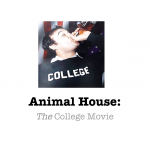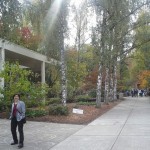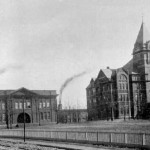This weekend I planned class sessions for my “Fictional Life of College” composition course, sent emails, pet my cats, talked with a friend about going to poetry readings, worked on my book at a coffee shop, and talked with my partner about a linguistic theorist. All pretty ordinary for a college teacher.
Except for Saturday morning’s realization that I went off to college exactly 20 years ago this month. This feels extraordinary. I’m fond of saying that my undergrad experience at Pacific University didn’t just teach me how to be an academic; my experience there taught me how to build a life. And here, I realize somewhat breathlessly, it is: my ordinary and wonderful life.
I love that a big part of my ordinary and wonderful life is teaching, and I love teaching a composition class wherein my students read, write, and communicate about college. In the first semester of the year-long sequence, we survey major issues in higher education, drawing from news, commentary, and scholarship. In the second semester, we examine how books, television, and movies such as Animal House form the cultural lore of higher education. We discuss how narratives of college are created, and how those discourses influence students’ expectations for themselves and their time as undergrads.
I’m not naïve about the pressure students are under to perform well in a major and get a great job upon graduation. I’m also well aware that many students, parents, and politicians have instrumentalist views of college education (Andrew Delbanco describes the view in “College at Risk”). While I do indeed hope they build great career foundations, and that my teaching helps them do so, I want them to own and love the lives they build. I want them to be exposed to concepts and stories they’ve never heard of (but will think about for years later), and to form ongoing mentoring relationships with professors and bosses. I want them to experience the shock of encountering someone or something new, and the thrill of recognition that comes with discovering the person or idea they always needed, even if they didn’t know it existed. However, I don’t try to dictate to them how and where and when this happens. Part of the fun of teaching is seeing a new set of undergraduate students navigate through their first year and discover their lives for themselves.
I’ll be first to acknowledge my nostalgia about my undergrad experience (just ask me about the classes I took in poetry, literature, history, geology, anthropology, and psychology; about working in the admissions office; about the costume parties and late-night conversations with roommates; about talking with guest speakers and musicians; about being student body president; and about catching movies in the coffee shop or eating dinners at professors’ houses). But it’s not the kind of nostalgia that closes the past off into a gauzy keepsake box, untouched and uncritiqued. It’s a kind of active nostalgia: fond memories living alongside a deep curiosity about current issues on college campuses. As a student, I was acutely aware of some of these conversations and controversies, including the place of technology (my 1994 entering class was the first at the school to have mandatory email addresses) and rising tuition / debt, and somewhat more vaguely aware of others, such as the structure of the university, the Greek system, sexual assault, alcohol, and tenure. When I started teaching my own classes in grad school, I wanted to see what had changed for my students: what were the big issues that impacted their college lives? My desire to know hasn’t diminished.
I love being the “guide on the side” as students engage with their new collegiate lives. I always ask at beginning of the semester: what is it like to be a college student in this place and at this time? I have designed this class to get them to think consciously now, usually as first-year students, about what college means to them. Many might not do this unless forced to, which tends to happen about halfway through their sophomore year, when their financial aid package for their junior year isn’t what they thought it would be, or when they encounter major disappointments with grades, relationships, or work, causing them to re-evaluate their goals and strategies. It’s imperative that they think about what they’re doing here before the inevitable mistakes and crises, and that they grapple meaningfully with the contradictions and controversies of college in coursework and conversation. I love that moment when their discussions about U.S. higher education history, mythology, and debates become personally and blazingly relevant. It thrills me to see them question the given narrative of their college lives and begin to write their own.
The assignments for this class, including digital research projects, literary and film analysis, blog posts, and presentations, further my students’ understanding and interrogation of “college,” in addition to building and strengthening their communication skills. But I also design these projects for me, because I want to know more about where I teach and about what my students are thinking, asking, and discovering. A favorite assignment is the campus space assignment, where students read some background about American campus design (from Paul Venable’s book on American campus planning), study old campus maps, and then go out and observe, experience, and write about a place on campus. The results tend to be touching and fascinating. I learn about my students’ embodied lives and the history of the institution. I know now that when I walk from the bus to my office, I walk through the ghost of Tech’s old shop building. I’ve learned that you can find at least one student on the Clough stairs at literally ANY hour during finals. I’ve come to count on the knowledge that every year, something a student sees, says, does, or writes in this class will take my breath away. I’m honored that this feels so ordinary.




I have to say that I really enjoyed hearing about your class, specifically that your composition class focused on a topic that each of the students are experience–college itself. I’ve tried with varying degrees of success to make the composition classroom relevant to students. Thus, rather than getting them to think about art and literature (like I do in my dissertation), I have, as of late, focused my composition classes on forms of reading, writing, and book culture that exists today in the digital age. Two questions that I would ask out of curiosity: 1) It seems that you have taught versions of this class before if I am reading you correctly. What methods/approaches do you use in the class that keep it engaging for yourself and students from semester-to-semester? I ask because this is my fourth semester teaching some version of my thematic composition course, and I’m thinking it’s time for a change. & 2) You referenced the idea about getting students to “think consciously” about their collegiate experience. Do you think this is because of your course’s theme? And if not, what are some techniques you think composition instructors could employ say in a course about technology, science, women’s studies, etc. that might also make students “think consciously” about their collegiate experiences/expectations?
Thank you for the comments!
My answer to your first question is: I keep a stable of assignments that (while I change them each a little every semester) tend to address a number of curricular needs for the students: argument, description, audience, aural and visual channels, design, and so on. This “stable” of dependable assignments has grown since I became a Britt, as I added more multi-modal projects to the mix. The most important method that I use to keep it fresh is to keep current: a) use current college news as much as possible so it reflects their lives–but keep a list of sources that raise good questions, are provocative, and speak to “timeless” issues of higher education, and, b) demonstrate a genuine curiosity about my students’ lives AS students.